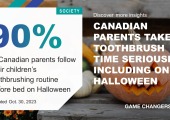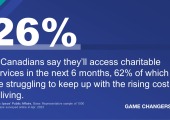Canadians' Economic Outlook
Consumer confidence in the Canadian economy continues to strengthen
Consumer confidence in the Canadian economy continues to strengthen: over one-half of Canadians surveyed feel Canada's economy is currently in good shape, and more than one in three expect the national economy to improve during the year ahead.
These findings emerged from a National Angus Reid/Southam News Poll conducted among a representative cross-section of 1,520 Canadian adults between November 26th and December 2nd, 1996.
In terms of consumers' outlook at the provincial level, Albertans remain most bullish when it comes to their expectations for their province's economy this year - fully two in three anticipate better times ahead.
Assessment of the Current State of the Canadian Economy
Canadians' appraisal of the overall health of the national economy continues to steadily edge in a positive direction, as it has since the beginning of the year. The state of the country's economy is currently awarded favourable marks by a clear majority (55%) of the Canadian public - 53 percent of those surveyed rated economic conditions today as "good", but only 2 percent opted for "very good". A negative assessment, on the other hand, was offered by 45 percent of respondents (37% "poor", 8% "very poor"). The number of Canadians rating the state of the national economy as "good/very good" is 4 points higher than recorded in September, and is fully 18 points ahead of the figure measured in January when a solid majority of 62 percent described it as poor. (Table 1)
A majority of surveyed Canadians from all major regions except Quebec offered a positive assessment of current economic conditions in Canada, peaking at 65 percent in Alberta. In Quebec, in sharp contrast, six in ten (59%) consumers surveyed said the Canadian economy is in bad shape (46% poor, 13% very poor).
Outlook for the Canadian Economy
The public's expectations for the national economy have improved significantly over the past couple of months. Better than one in three (37%) surveyed Canadians said they expect Canada's economy to "improve" during the coming year, compared to about one in five (22%) who expect things will "get worse". A plurality of 40 percent predicted the Canadian economy will "stay about the same" during the next 12 months. The proportion who currently provide an optimistic forecast has risen by 6 percentage points since our previous reading in September, and is fully double the level of optimism recorded back in January (when only 18% expected improvement versus 35% a downturn). (Table 2)
Regionally, optimism about the prospects for the national economy over the coming year is highest among residents of Alberta (47% expect improvement) and Ontario (44%). Optimists also outnumber pessimists in British Columbia (37% versus 26%), Manitoba/Saskatchewan (32% to 21%) and Atlantic Canada (31% compared to 22%). Once again, Quebecers are the most downbeat when it comes to Canada's economy - expectations in this province are currently evenly divided (29% foresee improvement, 27% anticipate a downturn, 44% no change).
Outlook for the Provincial Economies
Albertans remain the most bullish when it comes to consumers' outlook for the provincial economies. Fully two in three (67%) surveyed Albertans said they believe the Alberta economy will get better during the coming year (up from 60% in September and 54% in July), in stark contrast to only a handful (5%) who offered a gloomy forecast. Residents of Ontario also tend to be optimistic about their province's economic performance for the next 12 months (40% improve versus 25% get worse) (Table 3)
On the flip side of the coin, Quebecers continue to be more pessimistic than optimistic regarding their own province's economic fortunes: one in three (36%) foresee further deterioration in provincial economic conditions and a plurality (40%) anticipate the status quo to prevail, versus only one-quarter (23%) who expect that things will improve during the coming year. Pessimists also outnumber optimists in British Columbia by a two-to-one margin: 40 percent of those surveyed held a negative one-year outlook for the B.C. economy (compared to roughly 25% in earlier soundings taken this year), versus 20 percent who envisioned improvement.
Across the smaller provinces, meanwhile, expectations are fairly divided. In Manitoba/Saskatchewan, the numbers forecasting better and worse economic scenarios for their respective provinces are comparable (24% and 21% respectively), with the majority (53%) expecting little or no change. In Atlantic Canada, optimists and pessimists are also found in comparable numbers (32% improve versus 26% get worse), although the proportion harbouring a positive outlook has been increasing since the summer.
Outlook for Personal Financial Situation
There has been no change since earlier this fall in Canadians' outlook for their own financial well-being. Fewer than three in ten (27%) of those surveyed felt their personal financial prospects would take a turn for the better over the year ahead, compared to 18 percent who thought their own economic situation would worsen. A majority (53%) still expect the status quo to prevail as far as their own finances are concerned. (Table 4)
Consistent with their buoyant outlook for the national and provincial economies, residents of Alberta (38%) are the most optimistic in terms of their personal financial prospects for the coming year, followed by their counterparts in Ontario (30%). Meanwhile, optimism on the home front has slipped among British Columbians in recent months (24% expect their personal economic situation to get better, down from 36% in September).
This National Angus Reid/Southam News Poll was conducted by telephone between November 26th and December 2nd, 1996 among a representative cross-section of 1520 Canadian adults.
The actual number of completed interviews in each region was as follows: B.C. - 200; Alberta - 150; Manitoba/Saskatchewan - 123; Ontario - 526; Quebec - 401; Atlantic - 120. These data were statistically weighted to ensure the sample's regional and age/sex composition reflects that of the actual Canadian population according to the 1991 Census data.
With a national sample of 1520, one can say with 95 percent certainty that the results are within ±2.5 percentage points of what they would have been had the entire adult Canadian population been polled. The margin of error will be larger within regions and for other sub-groupings of the survey population.
For more information on this release, please contact:
Darrell Bricker
Senior Vice President
Angus Reid Group
(613) 241-5802
John Wright
Senior Vice-President
Angus Reid Group
(416) 324-2900
More insights about Consumer Goods


![[WEBINAR] KEYS: Global Trends - The Uneasy Decade](/sites/default/files/styles/related_more_insights/public/ct/event/2025-09/thumbnail-templates_0.png?itok=Qh37M2xL)
![[WEBINAR] Canadian EV Adoption Trends in 2025](/sites/default/files/styles/related_more_insights/public/ct/event/2025-01/thumb.png?itok=RSGzZvMm)
![[WEBINAR] Sustainable Packaging: A Potential Avenue of Distinction](/sites/default/files/styles/related_more_insights/public/ct/event/2023-09/SustainablePackaging_WebR_feature%20copy.jpg?itok=X0DpNf_C)